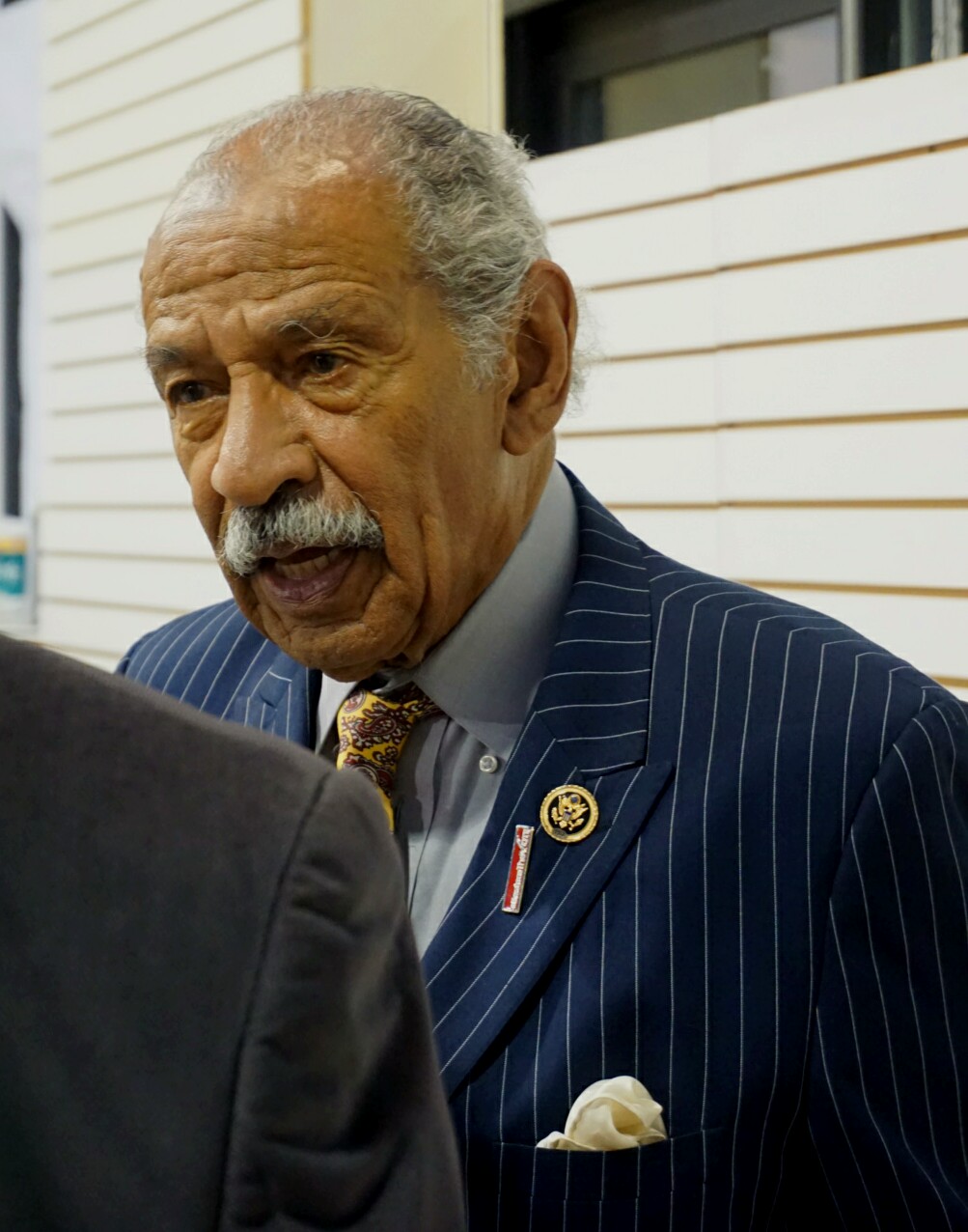Longest-Serving Member of U.S. House Takes on Reluctant Republican in Michigan’s 13th Congressional District
U.S. Rep. Conyers (D-MI,) longest-serving member in Congress, faces opponent who says it’s rough to run for GOP now.

In the race for Michigan’s 13th Congressional District. a trio of challengers are attempting to unseat an incumbent who’s been a fixture in the U.S. House for half-a-century.

On the hot August night of Michigan’s statewide primary elections, the longest-serving member currently in Congress glances at the crowd in his campaign headquarters.
It’s a scene 87-year-old Democratic Congressman John Conyers has been familiar with since he won his first primary election en route to entering Congress in 1965.
“I was so exhausted after that day, just like today, that I went home and fell asleep,” Conyers said. “And people had to come over to my house to tell me I won the primary. It’s a different kind of thing now.”
It’s different because, in many ways, Conyers has become a civil rights icon.
And even as he seeks his 27th term in Congress Conyers says he’s keeping an eye on the future.
Especially, he says, on increasing job opportunities in his district, which stretches from Detroit to Garden City. It’s an area saddled with rates of poverty and unemployment far higher than in much of the rest of the nation.

Conyers said, “See, when you say 5% unemployment, that means you have to skip the pockets of unemployment in Detroit that are 20%, 25%. And what we’ve got to do is work on programs that get into that.”
Yet Conyers past work on civil rights issues continues to endear him to supporters like Arthur Featherstone, who worked for the long-time Congressman alongside Rosa Parks in 1965.
Featherstone says the Detroit Democrat, who is also now the longest-serving African American in the history of Congress, demands the respect of constituents.
“I’d tell ‘em to vote for him because of all the things he has done down through the years,” Featherstone said. “Like the Selma drive. In 1965, when they came over the bridge in Selma, about five minutes later Dr. King called. I said ‘Uh oh.’ And Dr. King told John to start a food drive for Selma. We raised two truckloads of clothes and food for Selma.”
Conyers is known as one of the most progressive Democrats in the House.
But at least one challenger for his seat says being a loyal liberal is not necessarily a good thing.
Republican candidate Jeff Gorman is making his second consecutive bid to defeat Conyers.

Gorman said, “He is a rubber stamp for not just his party, but for the extreme part of his party. And talking to the people, going door to door, ‘cause I’m doing it the hard way, going door-to-door, that’s not where the people of the district lie.”
Gorman says he knows the usual criticism leveled at his opponent, that Conyers has grown too feeble, too distant from the needs of his district, too focused on national issues as the ranking member of the powerful U.S. House Judiciary Committee.
Gorman says he agrees with those arguments, but not the idea that Conyers’ seniority gives him, and by extension his constituents, extra clout in Congress.
This power thing that everybody touts, I don’t think that’s a thing,” Gorman said. “But more fundamentally what’s wrong with it is he’s been there for 50 years. I’m sorry, you can be clean as the driven snow coming there but eventually you’re corrupted in some way by being in the DC and you become part of the problem. I’m all for term limits. It’s an honor and a duty to serve there, (it’s) something that shouldn’t be a career.”
Gorman acknowledges the difficulty of dislodging someone with a half-century of name recognition.
But he also says the mood of the electorate, both nationally and in Michigan, is one seeking a change from traditional politicians. Gorman contends that feeling is drove the emergence of Donald Trump’s unconventional presidential campaign.
And Gorman says he can provide that change, vowing to weigh issues based on their individual merit, not their ideological significance.
In fact, Gorman says — especially in the Democratic bastion of Detroit — he’s campaigning as a somewhat reluctant Republican.
“I think it’s hard to run as a Republican,” Gorman said, “Not because of Trump. Just look at our own state here, our own state Republicans. We only just didn’t tell ‘em no but hell no about raising taxes to cover our roads. And they went ahead and did it anyhow. And it wasn’t a Democrat, it was a Republican that did that.”
Other candidates seem to view the race as a chance to publicize their political party as much as their campaign.
Challenger Tiffany Hayden is with Michigan’s Libertarian Party.
She writes in a web post that Conyers is no longer fit to serve because he’s been in Congress too long and does not respond to the needs of his constituents.
Hayden did not respond to repeated requests to be interviewed for this story.
Conyers other opponent, Working Class Party candidate Sam Johnson, declined to comment on his bid for Congress.
But other Working Class Party candidates say this election offers them the chance to introduce their populist group to the public.
That’s something the incumbent in the race does not need.
To both supporters and critics, the name “Conyers” remains one of the most recognizable on a Michigan ballot.
